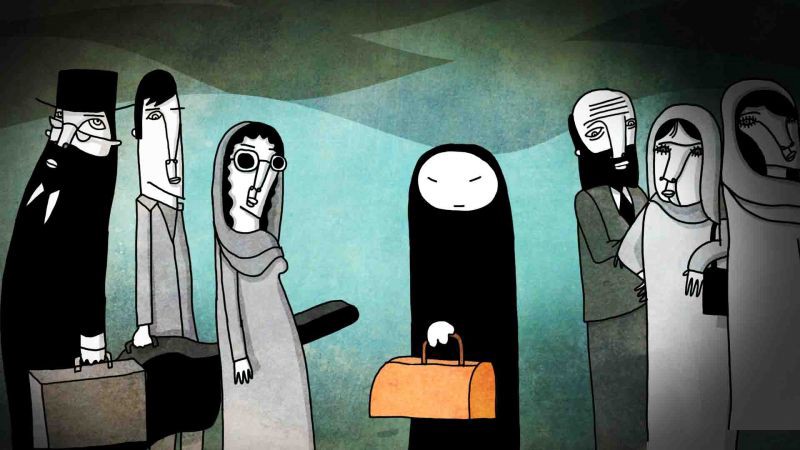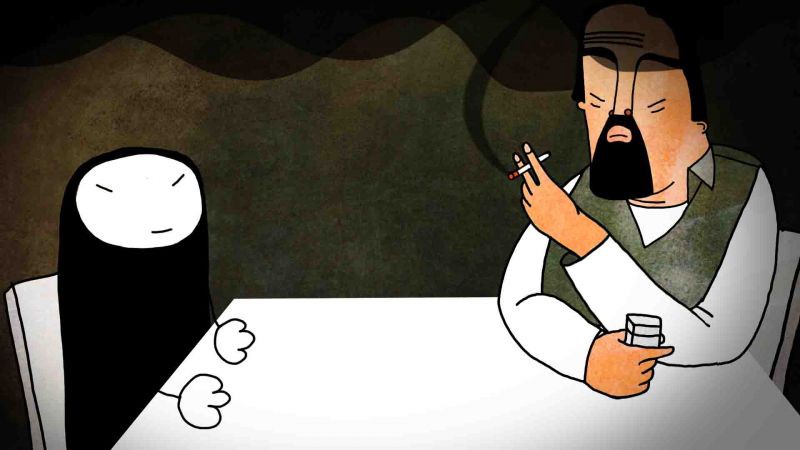If it had been released even one year ago, Ann Marie Fleming’s latest film, Window Horses, would probably have been described as a quaint, delicate story of art transcending borders: Set at a poetry festival in Iran that brings together European, Canadian, Chinese, and Persian artists, the film is a convincing 85-minute argument for the value of arts festivals in solving inter-cultural problems and healing old geopolitical and personal wounds. Yet, as it makes its United States debut in early 2017, that premise now seems tailor-made to protest the recent travel ban affecting citizens of seven Muslim-majority countries. With all due respect to last year’s Zootopia, Window Horses may be the most pointed rebuke of nationalist Trumpian geopolitics in 2017’s animated film market (it is screening at film festivals and seeking distribution this year).
It took the Canadian filmmaker, artist, and writer 20 years to get her original concept to the screen, but the film’s new relevance now that it’s finally being released doesn’t exactly please Fleming,whose previous films—I Was a Child of Holocaust Survivors; The Magical Life of Long Tack Sam; New Shoes—have often dealt with topics of social justice, diaspora, family, and identity. “I’m not happy about it being more relevant this week than ever before,” Fleming says when we meet an hour after she arrives in Santa Barbara for the city’s International Film Festival, still wearing the dark coat and yellow scarf she donned in Vancouver earlier that morning. “But I am very happy that it exists. It’s so funny to work on something for 20 years and then have it come to a place where it has something, I think, positive to add to the discussion.”
Window Horses centers on Rosie Ming (voiced by Sandra Oh), a young Canadian poet whose two parents emerged from two great eastern poetic traditions—her mother is Chinese, her father Iranian—and yet is obsessed with French Romantic poetry. When she travels to Iran to read at a poetry festival, Ming begins to appreciate the ancient culture of her father’s country, though she still resents him for leaving the family when she was young. The reason for his departure is kept in mysterious until the end, when participants at the festival start telling her stories about her absent father that suggest his disappearance may not have been an abandonment.
Fleming says the premise was originally inspired by her own experiences talking with artists from other countries at international film festivals—“It’s such a beautiful thing that maybe a lot of people don’t get to do on a regular basis, so I thought that it would be nice to share that,” she says. Twenty years later, as the film travels to festivals, “I think anybody else who even got dragged to the film, who would never see an animated film, never see a film about poetry, never interested in any stories about Iran, would sit there and find that they learned some things,” she says.
We talked to Fleming on Wednesday about setting a film in a place she’d never traveled to, collaborating with Iranian and Kurdish artists and storytellers, and the importance of international film festivals.

Viewers just checking out the premise for Window Horses now will probably be struck by how timely the idea is. But tell me a little bit about what inspired the film on your end, years ago.
The original story came to me in the way of a song that I wrote while I was staying at an artists’ residency in Germany. I was surrounded by artists, mainly writers, from all over the world, and I was hearing about their stories of exile and displacement. And also listening to stories from the other side of what I’d been brought up hearing about.

Myself, I’m mixed-race, I was born in Japan, my mom’s Chinese, my dad’s Australian, I’m an immigrant to Canada: I’ve always been really interested in people’s stories because who you are and what you look like always has to do with world events. What made you, forced you, compelled you, to be where you are—your family, right? I have this [motto]: “History is relatives.”
When I was in Germany I was introduced to [the Persian poet] Rumi along with a whole bunch of different poets and became very interested in the art of adaptation and translation because I was trying to learn another language and was in another culture. And I wanted to talk about all of these displaced generations that were trying to find their roots: Many years later, I went back to Vancouver and became involved in the Iranian community there—there’s a very large one—and listening to stories I was struck by (a) how little I knew I knew about Iran and (b) how much these stories reminded me of stories that I was hearing from all over the world, which really compelled me to rewrite the original story and revise it [to set it in Iran].
Why did you decide to set the film at a poetry festival, rather than a film festival? What about the medium was right for the film’s message?
These things become what they are through such a long route. It started off, in part, with my interest in poetry, then with what poetry came to me while writing the film, then also with the main character—she’s half-Chinese and she’s half-Iranian, so you’ve got these two very, very deep cultures where poetry from a millennia ago is still alive today.
Film is such a new medium, it’s just around 100 years old. I think that a film has poetry, but as a medium poetry is something that connects us, not just across cultures but across millennia.
The protagonist, Rosie, has never been to Paris but she writes a collection of poetry about Paris; you’ve said that you’ve never been to Iran. How did you go about tackling the challenges of depicting a country that you’d never been to?
That was big—it was terrifying for me to delve into that, having never been to Iran. I come from an independent, experimental, documentary background, and I am so aware of issues of appropriation. I’m not saying I am all-knowing or all-seeing, but what I did do is approach the story like a documentary film. I spent years researching, talking to, vetting the material that I was presenting. And finally when I came to making the film, and when I was working with actors and musicians and animators, they all helped me hone the script. The told me things that they felt weren’t right, or things that were no longer right, or things that might have a little more flavor, and everybody was really helpful. It’s true, real life does sort of mimic art because — so many people [in the film] help the main character too. People were really generous with me.
Did you have some people of Iranian descent working with you?
I had my cast, with actors like Shohreh Aghdashloo, Peyman Moaadi, Omid Abtahi, and Navid Negahban. Navid was especially helpful because he’s of the same age as the father in the film, or maybe a little younger—he was talking about his own experiences of the war [the 1979 Iranian Revolution]. People tell you these stories, and, in their recounting of them, they remember the oddest, sweetest details sometimes. Everything made it into the movie.

I had an animator, Bahram Javaheri, he did the paper animation in the Hafiz poem, and Jamal Salavati Khurdistani, who is a singer, who does the sound you hear from the muezzin, they’re both Kurdish. I started to learn that Iran is so many different cultures. Maybe that’s an obvious thing, but it was something that I spent a long time discovering.
The depiction of women’s roles in Iran in Window Horses is very nuanced. On the one hand, Rosie discovers certain limits for women in Iran while she’s there; on the other hand, characters laugh that she’s wearing the super-conservative chador. What informed your approach to female characters in this story?
The same thing that informs all the characters—my own experiences and what I observe in people I know. I’m dealing with Iran here, but I think we could say the same about every culture, it’s very complicated. At the end, that is something that the contributed to the plot point that sees Rosie transforming her dress [from the chador to a more casual hijab]. The women I worked with just really insisted that it wouldn’t feel right to them unless there was a change. With everything, I wanted to present things the way they are.
Just last week, the American president signed an executive order barring visits from citizens from seven countries, Iran being one of them. That has already stopped artists from entering the country at the Academy Awards and the Miami Film Festival. What do you hope viewers will take away from the film in this contemporary context?
The film talks about history. And one of the lessons it has, through the poems and stories, is that things change. It’s just like the exiled Chinese poet [in the film] Didi: He was not able to go back to China at one point but now he is, things change. It’s, how do we pass through this? I think people just live on through culture, family, community, art.
I wanted to make this film because I thought things were pretty difficult many years ago. And since I’d written it, it only becomes more complicated: In 2009, when there were the Iranian elections and all that violence, Canada cut off diplomatic relations and I was told to set it somewhere else, like in China, where I had roots. I tried to rewrite it, and I just kept on coming back to [the idea] that it had to be in Iran.
In the last administration, when they started opening up to Iran and removing sanctions, and now we’ve gone quite a way in the other direction. There was always going to be this ebb and flow. I hope this film—which is not a political film, I just wanted to show human beings, and I wanted to shed a little bit of light and wonder onto a civilization, that we often see in shorthand in negative ways, especially in North America. So I hope that people feel buoyed and that there is always resonance in individual gestures. I believe that tolerance and openness and listening to others before judging them will ultimately win.
The movie makes a great argument for arts festivals. Here in the U.S., celebratory arts events are being affected by this executive order. Very simply, why do international arts festivals matter?
It’s because of this conversation that you can have where we talk about what it is to be human about how we want to live, and the world we want to create, and what troubles us and what we celebrate. You have all these different images from people with very different views, and people come together in respectful discussion. It’s a beautiful experience, even with differing views. Art can show our better angels, even when we disagree.
This interview has been edited for length and clarity.




